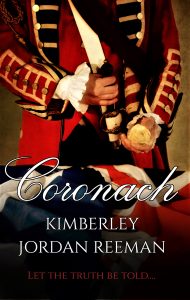HISTORY SCOTLAND INTERVIEW, FEBRUARY 2021
11 Feb 2021

A conversation with Rachel Bellerby, editor of History Scotland magazine. Rachel asks me:
At what stage in life did you first become aware of the Jacobite period and the turbulence of those years?
The first mayor of Toronto, where I was born, was a firebrand journalist and political agitator named William Lyon Mackenzie. In 1837 he led an abortive rebellion against the government of Upper Canada. When I was little, my grandfather used to tell me stories about “Mackenzie and the hanging tree”, and these so fascinated me that when, aged twelve, I found a biography of Mackenzie in the school library, I practically read it to pieces. It contained the intriguing sentence: “Both Mackenzie’s grandfathers were Highlanders, and both had been ‘out’ in the ′45.” I went straight to my parents’ encyclopedias to find out what the ′45 was, and my young writer’s mind was never the same. And the more I read, the more powerfully it spoke to me: its origins, its consequences, its inevitability, its setting within the context of the 18th century. It became my life.
Could you tell us more about your work as a writer? Do your characters and settings arrive fully or partially formed in your mind or does this happen as you begin to write?
It is my gift to see the past and my vocation to take you, the reader, by the hand and lead you into it. To allow you to experience it, not as costume drama or fantasy but as the substance of your very life. And, in that reality, to see through the eyes of my people. The soldiers, the rebels, the civilians, the victims, the survivors of war and terror. The characters walk into my mind, and it is my job to peel back the layers of each personality and discover their pasts, their memories, their loves, their fears. I call this ‘method writing’. And as I discover, so they lead me deeper into their world. I see what they see, I experience what they feel, I hear their voices, I see the play of light and shadow on their faces. I watch it like a film and direct with care, but I never control them. And, yes, sometimes they shock me. But war and its consequences are shocking. And, like a war correspondent, I bear witness to its truths.
If you could meet one of your characters in real life, who would it be and why?
Lieutenant-Colonel the Honourable Aeneas Bancroft, based on the real colonel of the 4th Regiment of Foot, Robert Rich, whose right hand was severed from his wrist by a Highland broadsword at the battle of Culloden. Bancroft is homosexual in a time when sodomy in the British armed forces is a crime punishable by death; he has become addicted to opium; and his love for his profoundly psychologically disturbed second-in-command becomes one of Coronach’s great tragedies. Bancroft haunts me: his passion, his yearning, his courage, his vulnerability. I feel the deepest compassion for him.
How important was it to you to have strong female characters in the narrative?
It never occurred to me that they would not be strong. Margaret, who speaks through me and whose memoir Coronach comprises, is a survivor, a child of war and rebellion, an eye-witness to history. Daughter, lover, companion, friend, surrounded by very dangerous men in a very dangerous age: you were strong, or you became a victim. Very little has changed for women.
What advice would you give to some one who would like to try writing historical fiction?
Learn your craft. Know your subject. Find your voice. Speak your truths— the truths of history and the truths of life— and let no one and nothing dissuade you from standing by them. Learn the rhythms of your characters’ speech: listen to them. And write, revise, rewrite, perfect. Because you are a wordsmith and a historian and a storyteller, and it is not just a hobby. It is the very essence of who you are.
The interview can be read online at https://www.linkedin.com/pulse/history-scotland-exclusive-interview-february-2021-jordan-reeman
